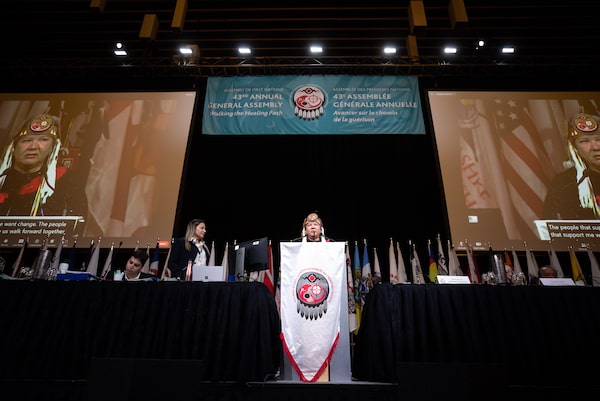
Assembly of First Nations National Chief RoseAnne Archibald speaks during the last day of the AGM in Vancouver, on July 5.DARRYL DYCK/The Canadian Press
First Nations chiefs from across Canada voted Thursday in favour of reviewing the Assembly of First Nations’ financial policies, and if deemed necessary, conducting a financial audit. The vote, which took place on the final day of the AFN’s annual general assembly, solidified support for National Chief RoseAnne Archibald, who was suspended by the AFN’s executive committee last month.
The National Chief has repeatedly called for a forensic audit, alleging financial improprieties within the organization.
Several leaders expressed frustration over the delayed schedule at the three-day gathering, which brought together hundreds of First Nations leaders, elders, and youth from across Canada to set the AFN’s priorities for the coming year, but was largely spent discussing two emergency draft resolutions related to the National Chief’s suspension.
Immediately after the vote, Brent Bissaillion, Chief of Serpent River First Nation in Ontario, said Serpent River would be suspending its participation from the assembly in protest, before he walked out of the hall at the Vancouver Convention Centre.
“I am expressing deep dissatisfaction with the national and regional leadership,” he said. “Our youth have called out this assembly for inaction … we can’t waste any more time on this, our people need us and we’re going home.”
AFN head RoseAnne Archibald calls her suspension unlawful
Many of the 48 draft resolutions were not discussed or voted on, including those focused on climate change, land claims, and the 231 calls for justice of the National Inquiry into Missing and Murdered Indigenous Women and Girls.
The National Chief is the subject of an external investigation after four AFN staff members raised complaints of bullying and harassment. Ms. Archibald’s suspension was a result of a statement she made on June 16, in which she accused the four complainants of seeking large contract payouts.
The resolution approving the financial review and potential forensic audit passed with 75 per cent of the vote. It directs the AFN’s Chiefs Committee on Charter Renewal to conduct a review of the AFN’s financial policies and practices and be responsible for determining whether a forensic audit is necessary. It also directs the National Chief and executive committee to co-operate in the investigation into the staff complaints.
The resolution specifies a 10-year time frame for the audit, which several people raised concerns about prior to the vote.
“A 10-year forensic audit is not going to be cheap. That is money that can be spent in our communities,” Nipissing First Nation Chief Scott McLeod said.
Mr. McLeod suggested a two-year timeline, though the resolution’s mover, Algonquins of Pikwakanagan First Nation Chief Wendy Jocko, declined the change. Kebaowek First Nation Chief Lance Haymond, who seconded the resolution, said it would get the answers that chiefs are asking for, but added, “our grassroots people want those answers as well.”
During discussions over the resolution, Andrea King, a councillor for the Mississaugas of the Credit First Nation, also questioned what the assembly had achieved.
“We have been here for three days and we have not done the work we have travelled here to do. What do I say to my community?” she said. “Am I returning with 44 unresolved resolutions meant to help address the plight of our Nations?”
Before the vote, Anne-Marie Ethier, an audit partner at Deloitte, spoke about AFN’s audited financial statements, but her responses did not appear to allay concerns. She did not answer a pointed question about whether there were “red flags” raised prior to the audit, answering simply that it had been performed to Canadian auditing standards.
The National Chief told the assembly that she would not sign off on Deloitte’s audit because she had questions, though Yukon Regional Chief Kluane Adamek, who is the chair of the AFN management committee, said that she has already signed off on it, and the National Chief’s signature was not required.
“I continue to be very clear about the fact that from our perspective and the information that was shared, I did not see any concerns with respect to the information,” she said.
Ahead of scheduled remarks, Minister of Indigenous Services Patty Hajdu said that the federal government supports the work the AFN is doing.
“I think all organizations go through a process of needing to examine themselves and determine for themselves if they’re fully meeting the obligations and the expectations of their members,” she said.
For subscribers: Get exclusive political news and analysis by signing up for the Politics Briefing.